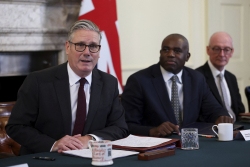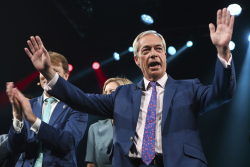
The headline of Ezra Klein’s buzzy New York Times column—“Stop Acting Like This Is Normal”—is correct, because “Democrats cannot pretend this is a normal Republican administration.” The narrow prescription Klein offers congressional Democrats is correct: “Should Senate Democrats partner with Senate Republicans to fund this government? I don’t see how they can.”
But with the September 30 deadline for passing spending bills necessary to keep the federal government open, Klein takes his strategic advice for Democrats one step too far. He wants Democrats to force a government shutdown and take the credit for it.
The case for a shutdown is this: A shutdown is an attentional event. It’s an effort to turn the diffuse crisis of Trump’s corrupting of the government into an acute crisis that the media, that the public, will actually pay attention to. Right now, Democrats have no power, so no one cares what they have to say. A shutdown would make people listen.
This is the assumption that every shutdown agitator has made and learned the hard way is completely wrong. I summed up the legacy of shutdown failures two years ago for the Washington Monthly:
The late 1995 to early 1996 Republican-led shutdown couldn’t force President Bill Clinton to swallow deep budget cuts. The 2013 Republican-led shutdown couldn’t force President Barack Obama to defund his signature health care program. The 2018 Democratic-led shutdown couldn’t force President Donald Trump to accept legislation protecting “Dreamers” from deportation. The late 2018/early 2019 Trump–led shutdown couldn’t force congressional Democrats to fund his border wall.
These failures taught us that shutdowns make people forget what you have to say. Public attention shifts to how shutdowns hurt average Americans and how one political party is willing to harm constituents to play political games. Once public opinion quickly turns, the shutdown agitators invariably realize the shutdown failed to provide negotiating leverage and eventually cave.
Klein counsels that a shutdown could only work if Democrats “pick a small set of policies and stick to that. They would have to choose those policies wisely. They would have to hold the line even when it got tough.” At this point, the argument is already collapsing on itself. Klein previously warned that “Donald Trump is corrupting the government” and “This is what Democrats cannot fund. This is what they have to try to stop.” But how does sticking to a “small set of policies” prevent funding Trump’s widespread corruption?
Some Senate Democrats reportedly want to strike a deal to extend enhanced Affordable Care Act subsides that are scheduled to expire. Josh Marshall argued, and David Dayen echoed, the point that such a deal would give Trump the chance to take credit for supporting health care ahead of the midterms. That would potentially help Republicans retain power, power which they could then use to break the deal.
And why would Democrats have to “hold the line even when it got tough?” Things getting tough means people getting hurt and Democrats losing public opinion. Losing public opinion means losing leverage. Without leverage, what comes next is caving.
Moreover, a hobbled federal government that deprives people of needed services will not bother Trump and his Republicans in the slightest. Another fallacy in the Klein argument is that with Elon Musk gone from the administration, Trump no longer wants to wreck the civil service:
… the scale of DOGE’s assault on the government has shrunk. Trump and Elon Musk went through a messy and public breakup. But the real reason it didn’t continue, I suspect, is that it’s Trump appointees running these agencies now. They don’t want their own agencies wrecked. They don’t want to be blamed for the failures that might result. They need staff.
Uh, take a quick look at what’s happening lately to the Centers for Disease Control and Prevention, the Federal Emergency Management Agency, the Environmental Protection Agency, the Department of Education, and the State Department. Wrecking agencies is what Trump likes to do, as is blaming others for the consequences of his transgressions, so he would leap at the chance to pin a shutdown and its impacts on Democrats.
A government shutdown simply would not stop anything Trump is doing. The authoritarian would exempt whatever he considers “essential” from shutdown—such as National Guard and Immigration and Customs Enforcement policing sweeps.
The choice Democrats face is not limited to abetting Republican authoritarianism and embracing a government shutdown. Democrats have a third option: End all negotiations with Republicans and tell them it’s their responsibility to keep the government open.
Normally, both parties would accept a degree of shared responsibility in our constitutional system to ensure the basic functionality of governance. But, as Klein notes, these are not normal times. The Trump administration has said openly, “the appropriations process has to be less bipartisan,” and has already reneged on bipartisan spending agreements with recissions. As I argued back in July, this gives Democrats every reason to say: You want a partisan appropriations process? You got it.
Walking away from the table—walking away from a negotiating partner who is demonstrably negotiating in bad faith—is not the same as wielding a government shutdown as a hostage.
Because Democrats could credibly say: We don’t want a government shutdown. We would work with Republicans on a bipartisan agreement if they included language to ensure the deal would stick, with no opportunity for partisan recissions. If they don’t want to do that, there’s nothing to discuss. But we’re not forcing Republicans to shut down the government. They have majority power. They have a proven willingness to revisit norms and rules. If they think bipartisan spending bills are terrible, they can junk the filibuster and pass them themselves. It’s their responsibility. If they want Democratic help, fine. If not, best of luck.
Will a Democratic washing of the hands stop authoritarian abuses of executive power? No. But a congressional minority is not in a position to do that. It’s not reasonable to put that burden on Democrats. Republicans, who do have considerable congressional power, are the ones who should be pressured to check Trump.
What Democrats can do is point out the failings of the Republicans in charge and offer an alternative agenda so they can gain congressional power in 2026 and then have more ability to constrain Trump. Owning a shutdown is unnecessarily taking a looming failure away from Republicans, and there’s no need for Democrats to make such an unforced error.
The post Ezra Klein (Almost) Gets It Right appeared first on Washington Monthly.


 5 hours ago
6
5 hours ago
6 










 Bengali (Bangladesh) ·
Bengali (Bangladesh) ·  English (United States) ·
English (United States) ·